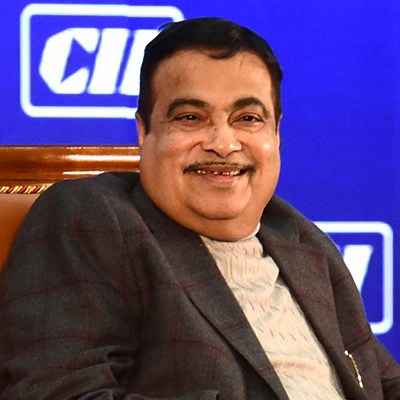
Nitin Gadkari
Minister of Road Transport and Highways
Government of India
Mr. Nitin Gadkari is the Minister for Road Transport and Highways (RT&H), Government of India. Mr. Nitin Gadkari was born on 27th May 1957 in a middle-class family with roots in agriculture in Maharashtra’s Orange-city Nagpur. Mr. Gadkari got involved very closely with the Rashtriya Swayam Sevak Sangh (RSS) and the Akhil Bharatiya Vidyarthi Parishad (ABVP) and took to social work in a big way.
Mr. Gadkari completed his Post-Graduation in Commerce, besides studying Law and obtaining a Diploma in Business Management. Mr. Gadkari has been honored with Doctor of Science (D.Sc.) by the Mahatma Phule Krishi Vidyapeeth (MPKV), Rahuri, Ahmednagar in 2021 and Dr. Panjabrao Deshmukh Krishi Vidhyapeeth (PDKV), Akola, Maharashtra in 2022 for his outstanding contributions to the field of agriculture and research for ensuring the financial security of farmers. In 2022, he received Doctor of Literature (D.Litt.) from the Dr. Babasaheb Ambedkar Marathwada University, Aurangabad for significant contributions in road and infrastructure development in the country.
Mr. Gadkari formally entered politics in 1980. Principally, he believes that Politics is an instrument to bring socio-economic reforms in society. He went on to become BJP’s State President in Maharashtra in 2005. He was elevated to the post of party’s National President at the young age of 52 in 2009. He served as PWD Minister in Maharashtra Government during 1995-99, and was leader of the Opposition in the State Legislative Council for four consecutive terms.
Mr. Gadkari is committed to promoting the use of alternative fuels, which are import-substitutes, cost effective, indigenous and pollution-free. Under Mr. Gadkari’s guidance, the city of Nagpur was the first city to explore alternative bio-fuels for transport, including Bio-CNG, Bio-Ethanol and LNG. Mr. Gadkari is also introducing Flex-Fuel engines to be run on 100% Ethanol. He also launched the first ever tractor in India, which is run on bio-CNG, thus providing additional income to farmers. He also emphasizes on adoption of Green Hydrogen as a clean and indigenous source of energy, across various industries and mobility sector. Recently, he has launched a car in Delhi, on pilot basis, which runs completely on Hydrogen.
Under his supervision, over 70,000 kms of National Highways have been constructed in the last 7 years and 30,0000 kms of new roads are being constructed Twenty-Seven world class access-controlled Greenfield expressway projects being led by Mr. Gadkari under Bharatmala Pariyojana phase-1, are presently in various Pstages of construction. They are of around 9000 kms in length and have a capital cost of Rs 4 Lakh Crores. Mr. Gadkari is a proponent of remote connectivity. Most of these Green Field alignments are passing through remote and tribal areas. These Greenfield Highways will promote socio-economic development of remote and tribal areas. He is the man behind marvelous engineering showcases like Bandra-Worli Sea Link, 55 flyovers in Mumbai, India‘s First Mumbai-Pune Expressway, 14-lane Delhi-Meerut Expressway, Nagpur’s Multi-Layer Metro-Rail cum Flyover system and the upcoming high-tech Delhi-Mumbai expressway. The Delhi-Mumbai distance will be covered in just 12 hours. This will change the entire dynamics of passenger and freight movement on this busiest corridor of India.
35 Multi-Modal Logistics Parks, 600 Way Side Amenities, 105 Tunnels, 28 Emergency Landing Strips are currently being developed under Mr. Gadkari’s His Ministry has also received around 285 proposals from State Governments to develop Ropeways. Mr. Gadkari has also initiated a Funicular Rail project in Ladakh which will help swift movement of people and goods (including 2-wheelers & domestic animals).
Among his other endeavors, unprecedented progress is evident in port industrialization, national water highway traffic, jetties for coastal tourism, Ganga-Yamuna cleaning, fund raising, asset monetization projects, etc.
Gadkari introduced the first ever Motor Vehicle Scraping Policy in the fight against Pollution and Road & Vehicle safety. The New FASTAG policy introduced by Mr Gadkari, is helping commuters to save fuel and time on Toll Plazas. Some of his major works include, unprecedented push for R&D in electric vehicles for developing alternative battery chemistries, such as Sodium and Aluminum batteries and Hydrogen fuel cells. With his waste to wealth policy, Mr. Gadkari is promoting use of new, advanced and recycled waste materials in road construction works. For fast and economical construction, he has mandated large scale use of pre-fabricated pre-cast concrete elements in the highways projects. He is encouraging tree plantation along the highways, installation of solar panels, rain water harvesting and artificial ground water recharge systems. Mr. Gadkari is committed towards the development of qualitative, time-bound, cost effective and sustainable world-class infrastructures in the country.
During his tenure as the Union Minister for Water Resources and Ganga Rejuvenation, the monumental “Namami Gange” project became a mass movement involving central and state government agencies, private sector and foreign investors, NGOs, spiritual and social organizations as well as the common people. With his political stature he resolved Inter-State disputes on Water sharing and River Linking, involving 16 rivers in 11 States in a short span of six The first Inland Waterway was developed during his tenure, and goods movement was commenced between Varanasi and Kolkata, adding a new dimension to the logistical history of inland water ways in the country. As a part of Amrit Sarovar Mission, he initiated to develop 40 farm ponds in Akola district in association with PDKV. This would help to create additional water storage in the region. Under his leadership, MoRTH has issued the guidelines for use of excavated material from water bodies in Highway construction.